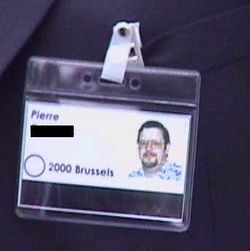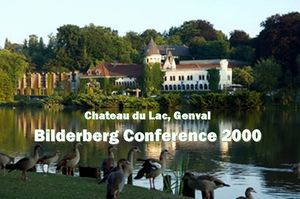Bilderberg/2000
The 2000 Bilderberg Meeting was the 48th such meeting and had participants from __ European countries, the United States and Canada. It was held at Genval, Brussels, Belgium.
Contents
- 1 Agenda
- 1.1 1. The New Economy and its Effects on Society
- 1.2 2. Globalisation under Threat: the Way forward for the WTO
- 1.3 3. US Elections: State of Play and Foreign Policy Consequences
- 1.4 4. Cleaning up the Balkans
- 1.5 5. EU Enlargement and its Implications for Geo-Political Balance
- 1.6 6. The European Far Right - Is there a Threat?
- 1.7 7. Current Affairs
- 2 Exposure
- 3 Press Release
- 4 Known Participants
- 5 Witnesses
- 6 References
Agenda
The 2000 Bilderberg Agenda has not been leaked, but the website at Bilderberg Meetings has posted an agenda.
1. The New Economy and its Effects on Society
2. Globalisation under Threat: the Way forward for the WTO
3. US Elections: State of Play and Foreign Policy Consequences
4. Cleaning up the Balkans
5. EU Enlargement and its Implications for Geo-Political Balance
6. The European Far Right - Is there a Threat?
7. Current Affairs
Exposure

Jim Tucker revealed where the 2000 Bilderberg was meeting.[1]
Press Release
Bilderberg.org has a press release from the 2000 Bilderberg:
The 48th Bilderberg meeting was held in Brussels, Belgium, 1-3 June 2000. Among other subjects the Conference discussed US Elections, Globalisation, New Economy, the Balkans, EU Enlargement, the European Far Right.
Approximately 100 participants from North America and Europe attended the discussions. The meeting was private in order to encourage frank and open discussion.
Bilderberg takes its name from the hotel in Holland where the first meeting took place in May 1954. That pioneering meeting grew out of the concern expressed by leading citizens on both sides of the Atlantic that Western Europe and North America were not working together as closely as they should on common problems of critical importance. It was felt that regular, off-the-record discussions would help create a better understanding of the complex forces and major trends affecting Western nations in the difficult post-war period.
The cold war has now ended. But in practically all respects there are more, not fewer, common problems - from trade to jobs, from monetary policy to investment, from ecological challenges to the task of promoting international security. It is hard to think of any major issue in either Europe or North America whose unilateral solution would not have repercussions for the other Thus the concept of a European-American forum has not been overtaken by time. The dialogue between these two regions is still - even increasingly - critical.
What is unique about Bilderberg as a forum is the broad cross-section of leading citizens that are assembled for nearly three days [in this case roughly two days, ed.] of informal and off-the-record discussion about topics of current concern especially in the fields of foreign affairs and the international economy; the strong feeling among participants that in view of the differing attitudes and experiences of the Western nations, there remains a clear need to further develop an understanding in which these concerns can be accommodated; the privacy of the meetings, which has no purpose other han to allow participants to speak their minds openly and freely.
In short Bilderberg is a small, flexible, informal and off-the-record international forum in which different viewpoints can be expressed and mutual understanding enhanced.
Bilderberg's only activity is its annual conference. At the meetings, no resolutions are proposed, no votes taken, and no policy statements issued. Since 1954, forty seven conferences have been held. The names of the participants are made available to the press. Participants are chosen for their experience, their knowledge, and their standing; all participants attend Bilderberg in a private and not an official capacity. There are usually about 120 participants of whom about two-thirds come from Europe and the balance from North America. About one-third are from government and politics, and two thirds from finance, industry, labor, education, communications.
Participants have agreed not to give interviews to the press during the meeting. In contacts with the news media after the conference it is an established rule that no attribution should be made to individual participants of what was discussed during the meeting.
There will be no press conference. A list of participants is appended.
Known Participants
91 of the 93 of the participants already have pages here:
| Participant | Description |
|---|---|
| Gianni Agnelli | Italian industrialist, 37 Bilderbergs |
| Umberto Agnelli | Italian business magnate with multiple deep state connections including the Bilderberg Steering committee. |
| Paul Allaire | Bilderberg Steering Committee member and board of the Council on Foreign Relations who headed Rank Xerox |
| Alfredo Ambrosetti | 6 times Bilderberg visitor Italian businessman |
| Otto Wolff von Amerongen | Bilderberg Advisory Committee member, deep politician |
| Bodil Nyboe Andersen | Danish central banker who pushed for introduction of the euro. Daughter of Bilderberger Poul Nyboe Andersen and attended 3 Bilderberg meetings herself. Trilateral Commission. |
| Beatrix Armgard | Former Dutch Queen. Survived 2009 Queen's Day Attack. In 1962 became the first woman to attend a Bilderberg meeting. Kicked a very heavy Bilderberg habit in 2015. |
| Israel Asper | Canadian-Jewish media mogul and "close friend of many of Canada's prominent political and business elite", with empire in "uncritical support for Israel and the United States." |
| Graham Avery | UK businessman, Chief Adviser for Enlargement, European Community |
| Percy Barnevik | Bilderberg Steering committee member in the Wallenberg Sphere |
| Dick Benschop | Attended the 2000 Bilderberg as Dutch State Secretary for Foreign Affairs, Tafelronde/Chair, Trilateral Commission, Shell CEO, Schiphol Airport Director |
| Franco Bernabè | Italian banker and manager, Steering Committee of the Bilderberg |
| Hans-Georg Betz | German academic who attended the 2000 Bilderberg possibly as a speaker on The European Far Right - Is there a Threat? |
| Carl Bildt | Swedish deep politician, serial Bilderberger and visitor to the MSC. Sitting on an impressive number of deep state related commissions. |
| Conrad Black | Fraudulent Bilderberg steering committee member |
| John Bruton | Club de Madrid, Triple Bilderberger Irish politician |
| Robin Buchanan | Triple Bilderberger US businessman |
| Kenneth Clarke | Bilderberg Steering committee, The Other Club, UK politician. When former child actor Ben Fellows went public with accusations that Clarke had assaulted him, Fellows was prosecuted for "attempting to pervert the course of justice". |
| Bertrand Collomb | Connected French businessman. 13 Bilderbergs. |
| Gerhard Cromme | Deep state connected German businessman visitor to the Bilderberg 2000 |
| George David | Greek Cypriot entrepreneur, Bilderberg Steering committee. |
| P. Nikiforos Diamandouros | Greek academic, Ombudsman of the European Union 2003-2013 |
| Christopher Dodd | US lobbyist, lawyer and politician. MPAA CEO |
| Tom Donilon | Spooky Bilderberger. Has advised the presidential campaigns of Jimmy Carter, Walter Mondale, Joe Biden, Michael Dukakis, Bill Clinton, Barack Obama, and Hillary Clinton, designing policy, managing conventions, preparing candidates for debates, and overseeing presidential transitions. His brothers are also deep state operatives. |
| Esther Dyson | Billionaire investor |
| Paolo Fresco | Italian Bilderberg businessman. Ex Fiat Chairman |
| David Frum | Neoconservative deep state operative who coined the phrase "axis of evil" |
| Louise Fréchette | Canadian politician who attended the 2000 Bilderberg as United Nations Deputy Secretary-General |
| Teresa Patrício Gouveia | Portuguese politician |
| Donald Graham | Son of Katharine Graham, TLC, Facebook, 10 Bilderbergs |
| Chuck Hagel | US Secretary of Defense, Chairperson of the President's Intelligence Advisory Board |
| Victor Halberstadt | A professor of economics, with a minimal Wikipedia page, who has attended all Bilderberg meetings since 1975. |
| Christian Hambro | Norwegian civil servant who attended the 2000 Bilderberg as Director of the Research Council of Norway |
| Erich Hampel | Bilderberger banker |
| Kay Bailey Hutchison | As ambassador to NATO said US prepared to consider a military strike to destroy Russian missiles. |
| Jan Huyghebaert | Belgian businessman, 11 Bilderbergs |
| Matías Rodríguez Inciarte | Former Bilderberg Steering committee, Spanish banker and possibly deep politician |
| Daniel Janssen | Bilderberg Steering committee Belgian business leader |
| Leif Johansson | Swedish businessman and son of Bilderberger. Attended 2 successive Bilderbergs. AstraZeneca Chairman. |
| James Johnson | US politician, Bilderberg Steering committee, various USDS connections, "chairman of the universe". |
| Vernon Jordan | Close friend of Bill Clinton. A member of the Bilderberg Steering committee who attended 34 Bilderberg meetings. |
| Muharrem Kayhan | Chairman of TÜSIAD. Bilderberg 2000 |
| Henry Kissinger | US deep politician, 40+ Bilderbergs, Nobel peace prize, war criminal |
| Hilmar Kopper | Bilderberg/Steering committee, chairman of Deutsche Bank |
| Henry Kravis | Like his wife, Marie-Josée Kravis, a billionaire multi-Bilderberger |
| Marie-Josée Kravis | Like her husband, Henry Kravis, a billionaire multi-Bilderberger |
| Pascal Lamy | Multi-Bilderberg former Director-General of the World Trade Organization |
| Maurice Lippens | Belgian banker who attended the 2000, 2002 and 2006 Bilderbergs. Trilateral Commission. Relieved of his position when the bank he managed was sold in parts during the financial crisis of 2008. |
| Paavo Lipponen | Penta-Bilderberger, Prime Minister of Finland |
| André Lévy-Lang | French banker on the Bilderberg Steering committee, 11 Bilderbergs, Le Siècle |
| ... further results | |
Witnesses
| Witness | Description |
|---|---|
| John Micklethwait | Editor of The Economist for 9 years then Bloomberg News |
| Adrian Wooldridge | UK journalist and columnist. Regular "observer" at the Bilderberg for The Economist. |
